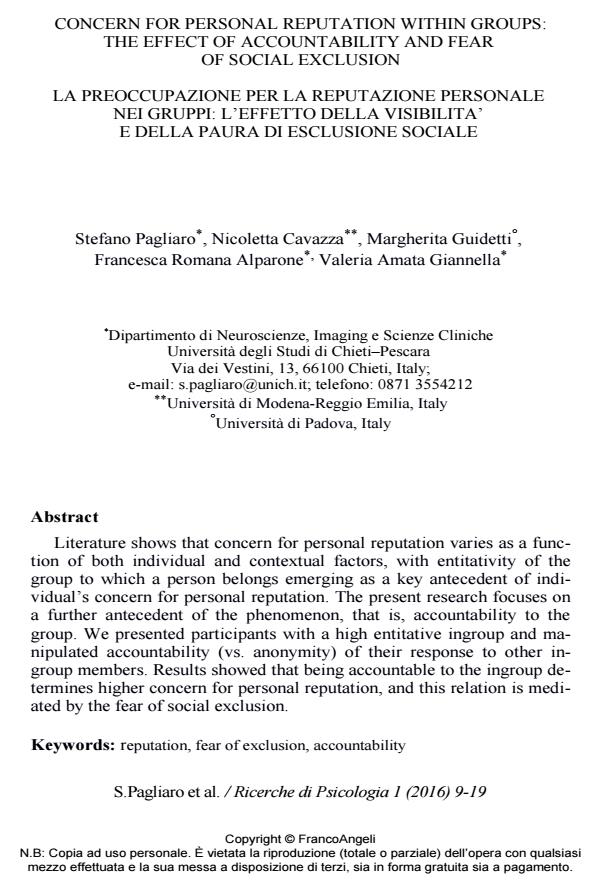Concern for personal reputation within groups: the effect of accountability and fear of social exclusion
Journal title RICERCHE DI PSICOLOGIA
Author/s Stefano Pagliaro, Nicoletta Cavazza, Margherita Guidetti, Francesca Romana Alparone, Valera Amata Giannella
Publishing Year 2016 Issue 2016/1
Language English Pages 11 P. 9-19 File size 52 KB
DOI 10.3280/RIP2016-001001
DOI is like a bar code for intellectual property: to have more infomation
click here
Below, you can see the article first page
If you want to buy this article in PDF format, you can do it, following the instructions to buy download credits

FrancoAngeli is member of Publishers International Linking Association, Inc (PILA), a not-for-profit association which run the CrossRef service enabling links to and from online scholarly content.
Literature shows that concern for personal reputation varies as a function of both individual and contextual factors, with entitativity of the group to which a person belongs emerging as a key antecedent of individual’s concern for personal reputation. The present research focuses on a further antecedent of the phenomenon, that is, accountability to the group. We presented participants with a high entitative ingroup and manipulated accountability (vs. anonymity) of their response to other ingroup members. Results showed that being accountable to the ingroup determines higher concern for personal reputation, and this relation is mediated by the fear of social exclusion.
Keywords: Reputation, fear of exclusion, accountability
- Conservation as Integration: Desire to Belong as Motivation for Environmental Conservation Stacey Mac Donald, Henk Staats, in Society & Natural Resources /2022 pp.75
DOI: 10.1080/08941920.2021.2023244 - What is known about personal reputation? A systematic literature review M. Victoria Carrillo-Durán, Ramsés Cabrera-Gala, Laura B. Sánchez-Baltasar, in Heliyon e15680/2023 pp.e15680
DOI: 10.1016/j.heliyon.2023.e15680
Stefano Pagliaro, Nicoletta Cavazza, Margherita Guidetti, Francesca Romana Alparone, Valera Amata Giannella, Concern for personal reputation within groups: the effect of accountability and fear of social exclusion in "RICERCHE DI PSICOLOGIA " 1/2016, pp 9-19, DOI: 10.3280/RIP2016-001001